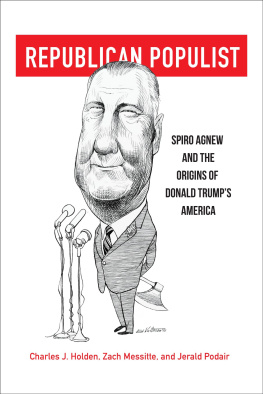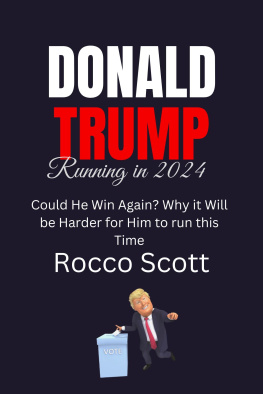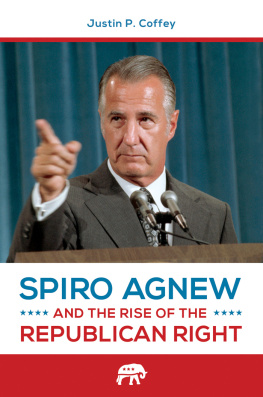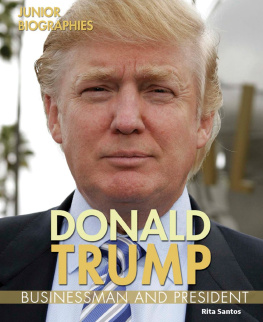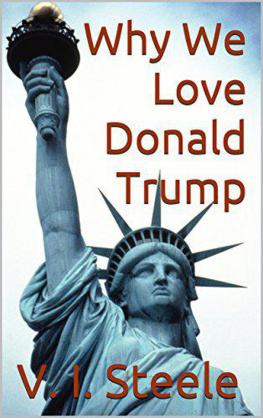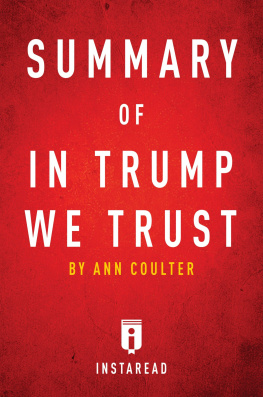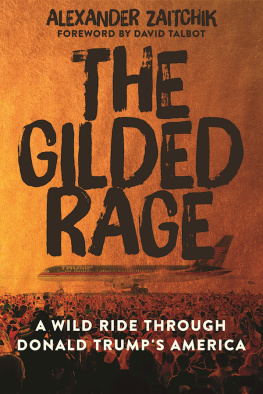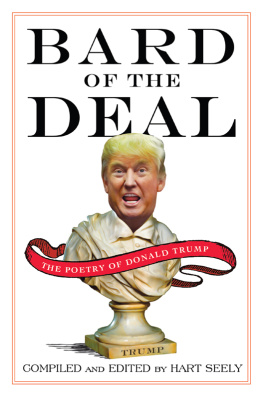Charles J. Holden - Republican Populist: Spiro Agnew and the Origins of Donald Trump’s America
Here you can read online Charles J. Holden - Republican Populist: Spiro Agnew and the Origins of Donald Trump’s America full text of the book (entire story) in english for free. Download pdf and epub, get meaning, cover and reviews about this ebook. publisher: Lightning Source Inc. (Tier 3), genre: Politics. Description of the work, (preface) as well as reviews are available. Best literature library LitArk.com created for fans of good reading and offers a wide selection of genres:
Romance novel
Science fiction
Adventure
Detective
Science
History
Home and family
Prose
Art
Politics
Computer
Non-fiction
Religion
Business
Children
Humor
Choose a favorite category and find really read worthwhile books. Enjoy immersion in the world of imagination, feel the emotions of the characters or learn something new for yourself, make an fascinating discovery.
- Book:Republican Populist: Spiro Agnew and the Origins of Donald Trump’s America
- Author:
- Publisher:Lightning Source Inc. (Tier 3)
- Genre:
- Rating:3 / 5
- Favourites:Add to favourites
- Your mark:
- 60
- 1
- 2
- 3
- 4
- 5
Republican Populist: Spiro Agnew and the Origins of Donald Trump’s America: summary, description and annotation
We offer to read an annotation, description, summary or preface (depends on what the author of the book "Republican Populist: Spiro Agnew and the Origins of Donald Trump’s America" wrote himself). If you haven't found the necessary information about the book — write in the comments, we will try to find it.
Charles J. Holden: author's other books
Who wrote Republican Populist: Spiro Agnew and the Origins of Donald Trump’s America? Find out the surname, the name of the author of the book and a list of all author's works by series.
Republican Populist: Spiro Agnew and the Origins of Donald Trump’s America — read online for free the complete book (whole text) full work
Below is the text of the book, divided by pages. System saving the place of the last page read, allows you to conveniently read the book "Republican Populist: Spiro Agnew and the Origins of Donald Trump’s America" online for free, without having to search again every time where you left off. Put a bookmark, and you can go to the page where you finished reading at any time.
Font size:
Interval:
Bookmark:
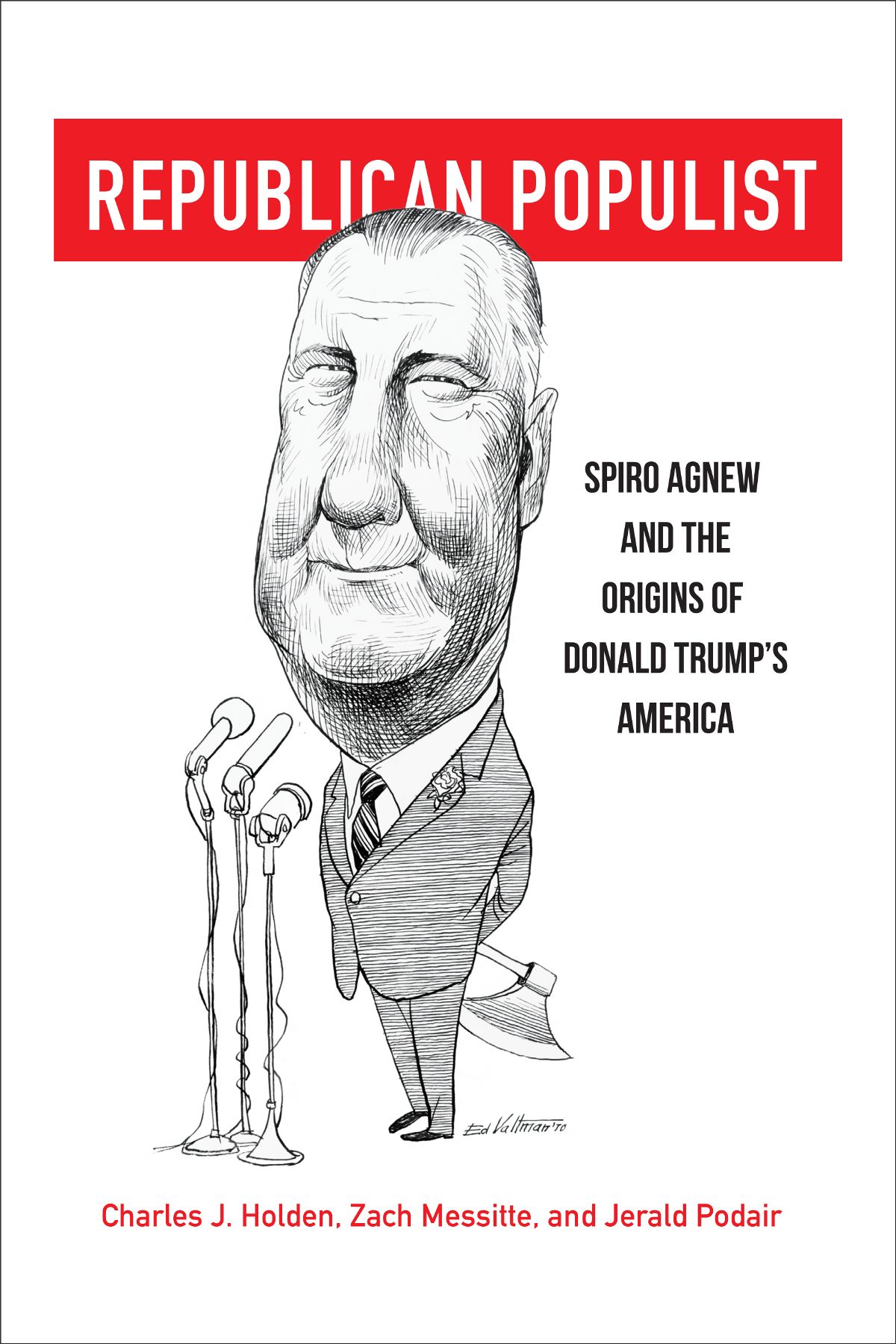
Charles J. Holden, Zach Messitte, and Jerald Podair
University of Virginia Press
CHARLOTTESVILLE AND LONDON
University of Virginia Press
2019 by the Rector and Visitors of the University of Virginia
All rights reserved
First published 2019
9 8 7 6 5 4 3 2 1
Library of Congress Cataloging-in-Publication Data
Names: Holden, Charles J., author. | Messitte, Zach P., author. | Podair, Jerald, author.
Title: Republican populist : Spiro Agnew and the origins of Donald Trumps America / Charles J. Holden, Zach Messitte, and Jerald Podair.
Description: Charlottesville : University of Virginia Press, 2019. | Includes bibliographical references and index. |
Identifiers: LCCN 2019006956 (print) | LCCN 2019010741 (ebook) | ISBN 9780813943275 (ebook) | ISBN 9780813943268 (cloth : alk. paper)
Subjects: LCSH: Agnew, Spiro T., 19181996. | Vice-PresidentsUnited StatesBiography. | PopulismUnited StatesHistory20th century. | ConservatismUnited StatesHistory20th century. | Political cultureUnited StatesHistory20th century. | Right and left (Political science)United StatesHistory20th century. | Republican Party (U.S. : 1854 )History20th century. | United StatesPolitics and government19691974.
Classification: LCC E840.8.A34 (ebook) | LCC E840.8.A34 H65 2019 (print) | DDC 973.924092 [B]dc23
LC record available at https://lccn.loc.gov/2019006956
Cover art: Agnew, drawing by Edmund S. Valtman, 1970. (Courtesy of the Library of Congress, Prints and Photographs Division)
The germination of this book began on November 11, 2005. That evening two of us, Chuck Holden and Zach Messitte, spent a couple of hours with the late Washington Post editor Ben Bradlee and syndicated columnist Richard Cohen at Bradlees home, Porto Bello, on the banks of the St. Marys River in southern Maryland. Cohen, who had been the Annapolis correspondent for the Post at the time of Agnews downfall in 1973, described a golden age of corruption in Maryland politics to us; later that same night he delivered the fourth Ben Bradlee Lecture in Journalism at St. Marys College of Maryland. We realized immediately that there was a larger story that had not yet been told. There was more to Spiro Agnew than just his alliterative speeches and his resignation. Then in 2014 we had the great fortune of befriending Jerry Podair, and our writing team was in place.
Over the course of the past few years, as the Republican Party continued to shift toward its so-called silent majority supporters, and as the Donald Trump campaign emerged, Agnews political trajectory took on even greater significance. We continued our discussionsduring baseball games at Miller Park in Milwaukee, on summer days by Green Lake in Wisconsin, and over lunches and dinners at Lawrence University and Ripon Collegeuntil the three of us had mapped out the book you have in your hands now.
As with any research project of this size and scope, many people and institutions deserve our thanks and appreciation.
The staff at the University of Marylands Hornbake Library, which houses Agnews papers, was unfailingly helpful and well organized. Special thanks go to Eric Stoykovich and Elizabeth Novara for helping us navigate the huge Agnew collection.
The University of Virginia Press, and in particular Dick Holway, the senior executive editor for history and the social sciences, saw the relevance early on of Agnews political story and his relationship to the modern Republican Party.
We also owe a special debt of gratitude to our former and current colleagues and friends at St. Marys College of Maryland, Lawrence University, the University of Oklahoma, and Ripon College who have encouraged our work and served as sounding boards as we progressed with the project. Our wonderful and smart student researchers over many years helped us track down details large and small. Our thanks goes to Alexa Beck, Tori Braun, Holly Chase, Reshma McHale, Ceren Oney, Natalie Reese, Joseph Rieu, Emma Saiz, and Megan Root.
The hard work and care of several administrative assistants allowed us to focus on the book even as we continued with our teaching, service, and other research roles: Erin Berry, Valerie Carlow, Donna Cline, Danielle Ficek, Claudia Leistikow, Lori Rose, and Abby Meatyard Thompson.
We would also like to add a few individual acknowledgments:
Zach Messitte: I am thankful as always for the love, support, and wisdom of my family: Julia Messitte, Peter and Susan Messitte, and Sam and Jules Messitte.
Jerry Podair: I would like to thank Lawrence University provost David Burrows for his friendship and support over the years, and my research assistant Emma Saiz for her indispensable help in bringing this book to fruition. I remain grateful to James McPherson and the late Alan Brinkley for the examples they have set for me and for all historians. As always, this book is for Caren and Julie.
Chuck Holden: Thanks to the coffee group and the history department at St. Marys College of Maryland for being wonderful scholars, teachers, and friends. Other friends have been encouraging throughout, especially Chris and Tracy Adams, Glen Hoyt, Rick and Kathy Morain, and Gene Blanshan. Finally, thanks always to my family: Rosemary and David Hoyt, Mike and Sue Holden, Mary Jo and Roger Kluesner, Ann and Gary Kendell, Bill Brunner, and all my nieces and nephews.
We disagree. Richard Nixons selection of Spiro Agnew to be his running mate in August 1968 proved to be one of the most underrated, consequential decisions in modern American politics, and it still reverberates a half century later. Although Agnews policy contributions during his five years in office were limited, he took on the important role of reshaping the trajectory of the Republican Party. His suburban, middle-class image, blended with his sharp-edged, anti-elite political style, launched his meteoric rise from an obscure county executive in a small border state to the man who was a heartbeat away from the presidency.
While there is no shortage of books about Richard Nixon, Bobby Kennedy, and the importance of the year 1968, scholarly work about Spiro Agnew is almost nonexistent. We hope that this book will help give Agnews historical significancefor better or worseits rightful place. We situate Agnew squarely, and prominently, in the lineage birthed by Barry Goldwater that is now ascendant in the GOP. It is a lineage that runs through Pat Buchanans presidential primary bids in 1992 and 1996, Sarah Palins brief star turn, the Tea Party, and most recently, Trumpism.
Since the 1960s the Republican Party has been based around a loose philosophy that has espoused support for smaller government, lower taxes, and a perceived toughness in foreign policy, particularly regarding the Soviet Union during the Cold War. The party found success at the national level in the past fifty years that had eluded it in the previous half century. And it has succeeded in achieving some of its primary policy purpose: the rollback of the New Deal/Great Society policy dominance that the Franklin Roosevelt/LBJ Democrats enjoyed from the 1930s through the 1960s.
Vice presidential scholars Christopher Devine and Kyle Kopko argue that the selection of the vice president often is justified on political, geographic, or policy grounds, but the electoral impact has been far from clear. The GOP establishment during these years nodded toward its populist wing by selective use of ticket balancing, best personified by vice presidential nominees like Bob Dole (1976), Dick Cheney (2000 and 2004), and Palin (2008). But in 2016 Trump was the firebrand at the top of the ticket. The more establishment figure (in this case Mike Pence) received the No. 2 spot to soothe the partys old guard. In 1968 it was precisely this act of ticket balancing that helped launch Agnews career.
Next pageFont size:
Interval:
Bookmark:
Similar books «Republican Populist: Spiro Agnew and the Origins of Donald Trump’s America»
Look at similar books to Republican Populist: Spiro Agnew and the Origins of Donald Trump’s America. We have selected literature similar in name and meaning in the hope of providing readers with more options to find new, interesting, not yet read works.
Discussion, reviews of the book Republican Populist: Spiro Agnew and the Origins of Donald Trump’s America and just readers' own opinions. Leave your comments, write what you think about the work, its meaning or the main characters. Specify what exactly you liked and what you didn't like, and why you think so.

